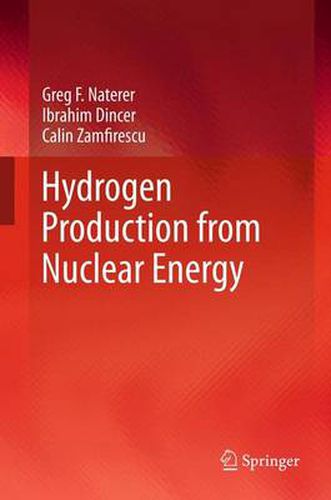Readings Newsletter
Become a Readings Member to make your shopping experience even easier.
Sign in or sign up for free!
You’re not far away from qualifying for FREE standard shipping within Australia
You’ve qualified for FREE standard shipping within Australia
The cart is loading…






This title is printed to order. This book may have been self-published. If so, we cannot guarantee the quality of the content. In the main most books will have gone through the editing process however some may not. We therefore suggest that you be aware of this before ordering this book. If in doubt check either the author or publisher’s details as we are unable to accept any returns unless they are faulty. Please contact us if you have any questions.
With the resurgence of nuclear power around the world, and the increasingly important role of hydrogen as a clean energy carrier, the utilization of nuclear energy for large-scale hydrogen production will have a key role in a sustainable energy future. Co-generation of both electricity and hydrogen from nuclear plants will become increasingly attractive. It enables load leveling together with renewable energy and storage of electricity in the form of hydrogen, when electricity prices and demand are lowest at off-peak hours of nuclear plants, such as overnight.
Hydrogen Production from Nuclear Energy provides an overview of the latest developments and methods of nuclear based hydrogen production, including electrolysis and thermochemical cycles. Particular focus is given to thermochemical water splitting by the copper-chlorine and sulphur-based cycles. Cycle configurations, equipment design, modeling and implementation issues are presented and discussed. The book provides the reader with an overview of the key enabling technologies towards the design and industrialization of hydrogen plants that are co-located and linked with nuclear plants in the future.
The book includes illustrations of technology developments, tables that summarize key features and results, overviews of recent advances and new methods of nuclear hydrogen production. The latest results from leading authorities in the fields will be presented, including efficiencies, costs, equipment design, and modeling.
$9.00 standard shipping within Australia
FREE standard shipping within Australia for orders over $100.00
Express & International shipping calculated at checkout
This title is printed to order. This book may have been self-published. If so, we cannot guarantee the quality of the content. In the main most books will have gone through the editing process however some may not. We therefore suggest that you be aware of this before ordering this book. If in doubt check either the author or publisher’s details as we are unable to accept any returns unless they are faulty. Please contact us if you have any questions.
With the resurgence of nuclear power around the world, and the increasingly important role of hydrogen as a clean energy carrier, the utilization of nuclear energy for large-scale hydrogen production will have a key role in a sustainable energy future. Co-generation of both electricity and hydrogen from nuclear plants will become increasingly attractive. It enables load leveling together with renewable energy and storage of electricity in the form of hydrogen, when electricity prices and demand are lowest at off-peak hours of nuclear plants, such as overnight.
Hydrogen Production from Nuclear Energy provides an overview of the latest developments and methods of nuclear based hydrogen production, including electrolysis and thermochemical cycles. Particular focus is given to thermochemical water splitting by the copper-chlorine and sulphur-based cycles. Cycle configurations, equipment design, modeling and implementation issues are presented and discussed. The book provides the reader with an overview of the key enabling technologies towards the design and industrialization of hydrogen plants that are co-located and linked with nuclear plants in the future.
The book includes illustrations of technology developments, tables that summarize key features and results, overviews of recent advances and new methods of nuclear hydrogen production. The latest results from leading authorities in the fields will be presented, including efficiencies, costs, equipment design, and modeling.